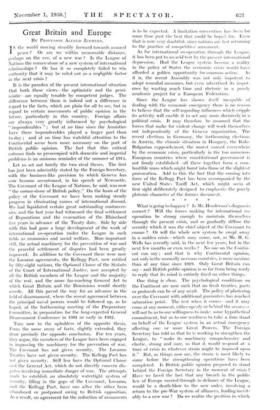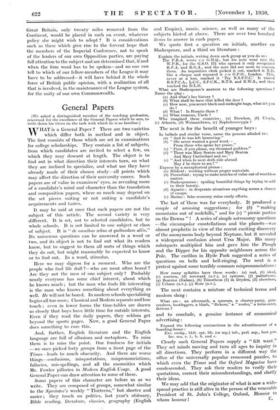Great Britain and Europe
Br PROFESSOR ALFRED ZtMMERN.
Is the world moving steadily forward towards assured ..I- peace ? Or are we within measurable distance, perhaps on the eve, of a new war ? Is the League of Nations the corner-stone of a new system of international relationships ? Or has it so completely failed to win authority that it may be ruled out as a negligible factor in the next crisis ?
It is the paradox of the present international situation that both these views—the optimistic and the pessi- mistic—are equally tenable by competent judges. The difference between them is indeed not a difference in regard to the facts, which are plain for all to see, but in regard to certain movements of public opinion in the future, particularly in this country. Foreign affairs arc always very greatly influenced by psychological " imponderables " ; but at no time since the Armistice have these imponderables played a larger part than to-day ; and at no time has watchful attention to the Continental scene been more necessary on the part of British public opinion. The fact that this critical autumn finds us preoccupied with domestic and imperial problems is an ominous reminder of the summer of 1914.
Let us set out briefly the two rival theses. The first has just been admirably stated by the Foreign Secretary, with the business-like precision to which Geneva has now become accustomed, in his speech at Newcastle. The Covenant of the League of Nations, he said, was now " the corner-stone of British policy." On the basis of the policy of the Covenant we have been making steady progress in eliminating causes of international discord. We had liquidated certain great outstanding controver- sies, and the last year had witnessed the final settlement of Reparations and the evacuation of the Rhineland five years in advance of the Treaty date. Side by side with this had gone a large development of the work of international co-operation under the League in such fields as economics and social welfare. More important still, the actual machinery for the prevention of war and the peaceful settlement of disputes had been greatly improved. In addition to the Covenant there were now the Locarno agreements, the Kellogg Pact, now ratified by fifty-eight nations, the Optional Clause of the Statute of the Court of International Justice, now accepted by all the British members of the League and the majority of the rest, and the more far-reaching General Act to which Great Britain and the Dominions would shortly accede. All this paved the way for an advance in the field of disarmament, where the recent agreement between the principal naval powers would be followed up, as he hoped, at the forthcoming meeting of the Preparatory Committee, in preparation for the long-expected General Disarmament Conference in 1931 or early in 1932.
Turn now to the upholders of the opposite thesis.
From the same array of facts, slightly extended, they draw precisely the opposite conclusion. For ten years, they argue, the members of the League have been engaged in improving the machinery for the prevention of war. The Covenant has not given security. The Locarno Treaties have not given security. The Kellogg Pact has not given security. Still less have the Optional Clause and the General Act, which do not directly concern dis-
putes involving immediate danger of war. The attempts made to establish an absolutely watertight system of security, filling in the gaps of the Covenant, Locarno, and the Kellogg Pact, have one after the other been abandoned or postponed owing to British opposition. As a result, no agreement for the reduction of 'armaments
is to be expected. A limitation convention has been for some time past the best that could be hopc,1 for. Even that is now very doubtful, since nations are fast returning to the practice of competitive armament.
As for international co-operation through the League, it has been put to an acid test by the present international depression. Had the League system become a reality in the policy of States the economic crisis would have afforded a golden opportunity for common act ion. As it is, the recent Assembly was not only impotent to adopt. remedial measures, but even advertised its impot- ence by wasting much time and rhetoric in a purely academic project for a European Federation.
Since the League has shown itself incapable of dealing with the economic emergency there is no reason to believe that the self-regarding influences which cripple its activity will enable it to act any more decisively in a political crisis. It may therefore be assumed that the forces that make for violent change will work themselves out independently of the Geneva organization. The recent elections in Germany, the forthcoming elections in Austria, the chronic situation in Hungary, the Halo- Bulgarian rapprochement, the unrest caused everywhere by the economic crisis, particularly in the too numerous European countries where constitutional government is not firmly established--all these together form a com- bustible mass which might burst into flame at the slightest provocation. Add to this the fact that the coming into force of the Kellogg Pact has been accompanied by the new United States Tariff Act, which might seem at first sight deliberately designed to emphasize the purely platonic character of the former document.
What is going to happen ? Is Mr. Henderson's diagnosis correct ? Will the forces making for international co- operation be strong enough to maintain themselves through the present crisis, and so gradually diffuse the security which it was the chief object of the Covenant to ensure ? Or will the whole new system be swept away in a sudden crisis—which may come, not, as Mr. IL G. Wells has recently said, in the next few years, but in the next few months or even weeks ? No one on the Contin- ent can say ; and that is why Continental opinion, not only in the normally nervous countries, is more anxious than at any time since 1919. Only Great Britain can say—and British public opinion is so far from being ready to reply that its mind is entirely fixed on other things.
One thing is clear. The psychological conditions on the Continent are now such that no fresh treaties, pacts or protocols can be of any avail. The policy of plastering over the Covenant with additional guarantees has reached saturation point. The test when it comes—and it may come at any moment, either openly or behind the scenes— will not be as to our willingness to make some hypothetical commitment, but as to our readiness to take a firm stand on behalf of the League system in an actual emergency affecting one or more Great Powers. The Foreign Secretary has told us that he is working to strengthen the League, to "make its machinery comprehensive and elastic, strong and sure, so that it would respond at a time of crisis to whatever strain might he imposed upon it." But, as things now are, the straits is most likely to come before the strengthening operations have been completed. Is British public opinion prepared to stand behind the Foreign Secretary in the moment of crisis ? Have we faced the fact that any breach in the public law of Europe carried through in defiance of the League, would be a death-blow to the new order, involving a return to the pre-War system of alliances, leading inevit- ably to a new war ? Do we realize the position in which
Great Britain, only twenty miles removed from the Continent, would be placed in such an event, whatever policy she might wish to adopt ? It is considerations such as these which give rise to the fervent hope that the members of the Imperial Conference, not to speak of the leaders of our own Opposition parties, arc paying full attention to the subject and are determined that, if and when the firm word has to be spoken—and no one can tell to which of our fellow-members of the League it may have to be addressed—it will have behind it the whole force of British public opinion, with a realization of all that is involved, in the maintenance of the League system, for the unity of our own Commonwealth.











































 Previous page
Previous page